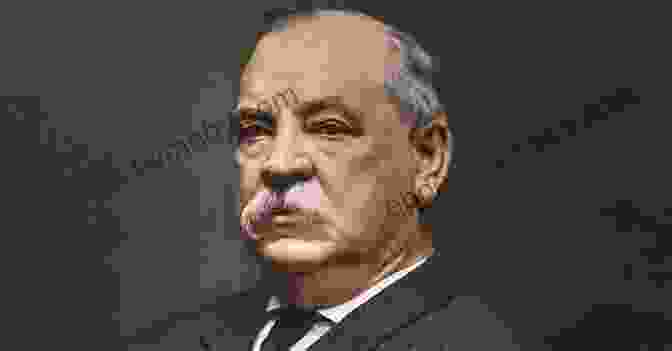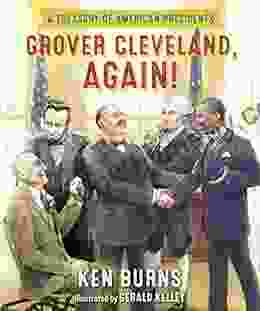Grover Cleveland: The Statesman Who Restored Fiscal Responsibility to the Nation's Treasury

A Comprehensive Treasury of American Presidents
Grover Cleveland, the 22nd and 24th President of the United States, served during a critical period in American history. His unwavering commitment to fiscal responsibility and his resolute leadership left a lasting impact on the nation's financial well-being.
Early Life and Career

4.7 out of 5
| Language | : | English |
| File size | : | 109825 KB |
| Text-to-Speech | : | Enabled |
| Enhanced typesetting | : | Enabled |
| Word Wise | : | Enabled |
| Print length | : | 91 pages |
| Screen Reader | : | Supported |
Grover Cleveland was born in 1837 in Caldwell, New Jersey. He studied law, became a successful attorney, and entered politics as the Mayor of Buffalo, New York. In 1882, he was elected Governor of New York, where he gained national attention for his honest and efficient administration and his opposition to political corruption.
First Presidency (1885-1889)
In 1884, Cleveland was elected President, becoming the first Democrat to hold the office since James Buchanan. During his first term, he pursued a conservative fiscal agenda, reducing the national debt and vetoing numerous spending bills. He also supported civil service reform, signing the Pendleton Civil Service Reform Act in 1883.
Economic Policies
Cleveland's commitment to sound fiscal policies was unwavering. He believed in a balanced budget, low tariffs, and a stable currency. He saw the national debt as a burden on future generations and worked tirelessly to reduce it. His policies, known as "Clevelandism," were unpopular with many, but they helped to stabilize the economy and restore confidence in the nation's financial system.
Tariff Issue
One of Cleveland's major challenges was the high protective tariff rates that had been in place for decades. He believed that these tariffs were unfair to consumers and that they led to high prices and inefficient manufacturing. In 1887, he vetoed the Mills Tariff Bill, which would have reduced tariffs, but it was overridden by Congress. The tariff issue played a significant role in Cleveland's defeat in the 1888 presidential election.
Second Presidency (1893-1897)
After losing his bid for re-election, Cleveland returned to private life. However, in 1892, he was again nominated for President and won by a narrow margin. During his second term, he faced a severe economic crisis, known as the Panic of 1893. He responded to the crisis by increasing tariffs through the Wilson-Gorman Tariff Act, but this proved unpopular and did little to alleviate the economic distress.
Gold Standard
Cleveland's second presidency was also marked by his unwavering support for the gold standard. He believed that a stable currency was essential for economic stability and opposed the efforts of some to issue more paper money, which he believed would lead to inflation.
Foreign Policy
In foreign policy, Cleveland pursued a conservative and isolationist approach. He avoided entangling alliances and focused on maintaining peace and protecting American interests. He negotiated a settlement to the Venezuela-British Guiana bFree Download dispute, which prevented war between the two countries.
Legacy
Grover Cleveland's presidency was marked by both achievements and challenges. His commitment to fiscal responsibility and his resolute leadership helped to restore the nation's finances and establish a stable economic system. However, his opposition to protectionist tariffs and his conservative approach to economic issues made him unpopular with many. Nevertheless, his legacy as a statesman who placed the nation's interests above politics endures.
Grover Cleveland is a complex and fascinating figure in American history. His unwavering commitment to fiscal responsibility and his resolute leadership left a lasting impact on the nation's financial well-being. His legacy as a statesman who placed the nation's interests above politics continues to inspire generations of Americans.
4.7 out of 5
| Language | : | English |
| File size | : | 109825 KB |
| Text-to-Speech | : | Enabled |
| Enhanced typesetting | : | Enabled |
| Word Wise | : | Enabled |
| Print length | : | 91 pages |
| Screen Reader | : | Supported |
Do you want to contribute by writing guest posts on this blog?
Please contact us and send us a resume of previous articles that you have written.
 Book
Book Novel
Novel Page
Page Chapter
Chapter Text
Text Story
Story Genre
Genre Reader
Reader Library
Library Paperback
Paperback E-book
E-book Magazine
Magazine Newspaper
Newspaper Paragraph
Paragraph Sentence
Sentence Bookmark
Bookmark Shelf
Shelf Glossary
Glossary Bibliography
Bibliography Foreword
Foreword Preface
Preface Synopsis
Synopsis Annotation
Annotation Footnote
Footnote Manuscript
Manuscript Scroll
Scroll Codex
Codex Tome
Tome Bestseller
Bestseller Classics
Classics Library card
Library card Narrative
Narrative Biography
Biography Autobiography
Autobiography Memoir
Memoir Reference
Reference Encyclopedia
Encyclopedia Michelle Cook
Michelle Cook Karen Lynch
Karen Lynch Patrick Schulte
Patrick Schulte Kathy Haveron
Kathy Haveron Robert Gerstemeier
Robert Gerstemeier Kathryn Kellogg
Kathryn Kellogg Nicole Curtis Ammerman
Nicole Curtis Ammerman Lorin Olsen
Lorin Olsen Kay Thompson
Kay Thompson Kathy Seaman Shaw
Kathy Seaman Shaw Justine Reeve
Justine Reeve Rebecca Smallberg
Rebecca Smallberg Justine Bateman
Justine Bateman Sonja B
Sonja B Katie Hewett
Katie Hewett Paul Levy
Paul Levy K C Jones
K C Jones Keith Payne
Keith Payne Keith Van Sickle
Keith Van Sickle Kelly Hodge
Kelly Hodge
Light bulbAdvertise smarter! Our strategic ad space ensures maximum exposure. Reserve your spot today!

 Branson CarterAnd Other Writings Penguin Classics: A Timeless Guide to Stoic Wisdom and...
Branson CarterAnd Other Writings Penguin Classics: A Timeless Guide to Stoic Wisdom and...
 Jessie CoxStep into the Strange World of "Ice Cream Man Vol 1: Strange Neopolitan" - A...
Jessie CoxStep into the Strange World of "Ice Cream Man Vol 1: Strange Neopolitan" - A...
 F. Scott FitzgeraldUnveiling the Secrets of Multinational Corporations Venturing into Emerging...
F. Scott FitzgeraldUnveiling the Secrets of Multinational Corporations Venturing into Emerging... Trevor BellFollow ·8.4k
Trevor BellFollow ·8.4k Patrick HayesFollow ·10.5k
Patrick HayesFollow ·10.5k Greg CoxFollow ·13.4k
Greg CoxFollow ·13.4k Floyd RichardsonFollow ·2.7k
Floyd RichardsonFollow ·2.7k Garrett PowellFollow ·13.9k
Garrett PowellFollow ·13.9k F. Scott FitzgeraldFollow ·10.7k
F. Scott FitzgeraldFollow ·10.7k Beau CarterFollow ·16.2k
Beau CarterFollow ·16.2k Rex HayesFollow ·17.1k
Rex HayesFollow ·17.1k

 George Orwell
George OrwellPandemic with Dogs: Two Essays
By Susannah Charleson In the midst of...

 Leo Mitchell
Leo MitchellAdam Smith's The Wealth of Nations: A Classic Treatise on...
Adam Smith's The...

 Cade Simmons
Cade SimmonsUnlock Your Communication Potential: Effective Techniques...
Communication is a fundamental...

 Floyd Richardson
Floyd RichardsonFire and Ashes: Success and Failure in Politics
Fire and Ashes: Success and...

 Oliver Foster
Oliver FosterUnlock the Enchanting Mystery of Ken Follett's "The Key...
Embark on a captivating literary journey into...
4.7 out of 5
| Language | : | English |
| File size | : | 109825 KB |
| Text-to-Speech | : | Enabled |
| Enhanced typesetting | : | Enabled |
| Word Wise | : | Enabled |
| Print length | : | 91 pages |
| Screen Reader | : | Supported |








